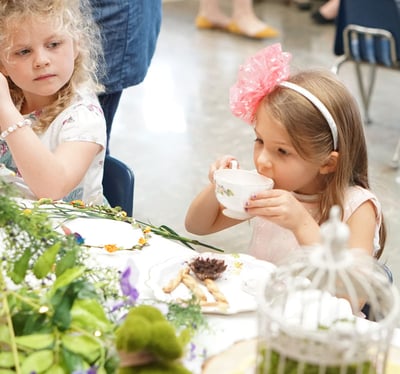Imagine you’re a parent of little ones (say, a four and six year old). Maybe you don’t have to imagine, because you’re already right there.
Imagine you’ve been given the opportunity as a family to attend an elegant occasion. Perhaps your husband won a prestigious award with a formal dinner reception to celebrate.
Raise your hand if you’d be excited to bring your little munchkins along for the crystal-clanging, delicacy-dining experience.
Okay, I’m sure there are some of you out there who do relish this sort of thing, and who have managed to raise exceptionally well-mannered young children who share your sentiments. Kudos, my friends. You keep doing your thing (and let me know your secrets!).
 For the rest of us, a fancy outing with our littlest offspring sounds like a special form of torture. Visions of fidgety complaints, broken glassware, rejected food, noisy voices, and sibling squabbles dance in our heads.
For the rest of us, a fancy outing with our littlest offspring sounds like a special form of torture. Visions of fidgety complaints, broken glassware, rejected food, noisy voices, and sibling squabbles dance in our heads.
There’s a reason why these types of events are typically not kid fare. They’re not designed for children, and that’s okay! Young kids aren’t inclined to sit peacefully, speak quietly, eat daintily.
Now, if it’s an adult that you dread to have accompany you to such an occasion because of their boorish, brash behavior...well, isn’t that one of those tricky societal problems we wish we didn’t have to encounter?
Mannerly Kids Become Considerate Adults
You may say it all comes down to manners. And yes, in a big way, it does. Certainly there are many occasions that pop up in our daily lives (from our earliest to our latest years) that call for the exercise of good manners.

But, you see, if you dig deeper it really comes down to having a heart of consideration. When you have that discipline in your heart - to see others around you and understand how your words and actions affect them - then it’s easy to have good manners. Our manners are (or should be) simply an overflow of our sincere benevolence.
This heart attitude can (and should) be cultivated at a young age. It starts in our homes, in the menial moments of our days when we find opportunities to look out for and serve others. It continues at school, when the culture fosters a heart of service and decorum.
And here’s where the reverse principle comes into play. By teaching good manners to kids at an early age, we can establish a habit of deference that turns the heart likewise. For many kids, giving priority to others around them just doesn’t come naturally (there’s that whole selfish sin nature thing going on). But in making the behaviors of good manners a habit early in life, it can help train their hearts and minds to pause and consider how they can serve their neighbors with daily kindness. Then, hopefully, those kids don’t grow up to be the uncouth adults to which I referred earlier, but rather the type of person that you’d be pleased to accompany to any occasion.
A School Culture That Cultivates Manners
Here at Veritas, we start this process early, and it shows in our upper school students’ behavior. Kids rise when an administrator enters the room. Boys allow girls to go first at meal times. There is an expectation of decorum - not a formal stiffness, but a simple call to serve our peers and treat others with respect as fellow image bearers and as authority figures.
 It all begins in our Kindergarten classroom, where veteran teacher Mrs. Lake models and institutes a culture of good manners and consideration among students to get them off on the right foot. Through her gentle yet firm spirit and kind demeanor, she helps the kids understand the importance and the joy found in using good manners. It is an expectation within the class that not only brings structure but also peace to these often exuberant little ones.
It all begins in our Kindergarten classroom, where veteran teacher Mrs. Lake models and institutes a culture of good manners and consideration among students to get them off on the right foot. Through her gentle yet firm spirit and kind demeanor, she helps the kids understand the importance and the joy found in using good manners. It is an expectation within the class that not only brings structure but also peace to these often exuberant little ones.
There are special events scattered through the year that can serve to reinforce these disciplines and help the kids put good manners into practice, like our Tea Party (of course, celebrating the letter “T”). The kids put on their better-than-Sunday-best and sip from fine china teacups. The boys present the girls with flowers and pull out their chairs. And the kids (and adoring parents) just eat it up with pleasure!
In honor of this delightful little Kindergarten occasion, our teacher Mrs. Lake put together a list of five manners that she works to establish in her classroom, emphasized not only by this event but all throughout the year. You can work with your little ones at home to help them master these manners (whether they go to Veritas Academy or not!) so that they can grow into respectful loving, serving, thinking young men and women.
Five Manners for Kindergartners in a Classical Christian School
1. Always say please and thank you when asking for something
It’s probably the most basic of all manners, but should never be overlooked. A cornerstone of good manners is having a heart of gratitude, and simply saying please and expressing thanks when someone does something for you is foundational. So keep reminding and expecting this of your little ones, for favors big and small. It will take them far!
2. Boys should be gentlemen, even when they’re little.
Some may call it sexist. We call it chivalry. It’s not because women are lesser beings who are unable to pull out their own chairs or open their own doors. It’s simply because we want our boys to recognize the value and beauty found in their sisters in Christ. So Mrs. Lake expects the boys in her class to act as gentlemen toward the girls. This includes:
-
Holding the door for the girls
-
Allowing the girls to line up first for their food
-
Looking out for the girls, taking care of and protecting them
You can train your little guy to show respect to the little ladies around him, and to find ways to look out for her best interests. Mrs. Lake hopes that the boys in her class will take pride in taking care of the girls, stepping up to serve them out of Christlike love. It may be a tall order for kindergartners - and sure we may only catch occasional glimpses in our young ones - but a respect for ladies starts early and continues through adulthood.
3. Boys and girls should be considerate of and kind to one another.
Yes, the consideration goes both ways between the genders. We don’t have to tolerate the “boys are gross” and “girls have cooties” taunting typical of kids. God has made boys and girls to have unique and valuable qualities, and we expect our kids to treat one another accordingly and see the value that each other has. So that’s why, at the tea party, the boys hand the girls flowers - with big smiles on both their faces - before pulling out their chairs. They tell each other how nice they look. In short, they appreciate one another.
Girls, show gratefulness
Along these lines, the girls are taught to thank the boys and be grateful for their help. When your young lady encounters a gentleman, encourage her to show thankfulness. It doesn’t mean she’s not a capable spirit herself when a boy says “ladies first”, and by no means is it meant to squash our little girls’ emerging abilities and independence. We need not be afraid that when a boy holds the door that he’s also going to snatch her voice, her vote, or her rights. I daresay, holding a door is vastly preferable to the demeaning behavior of so many men in our culture. So, let us help our girls be thankful when a boy acts like a gentleman toward her.
 4. Get dressed up in your finery.
4. Get dressed up in your finery.
It seems to be a lost art nowadays, getting all dressed up and fancy. Everything from restaurants to family gatherings to church has become less formal (and, yes, in many ways that can be a good thing). Let your kids have the opportunity to get all dressed up and learn how to carry themselves appropriately. It’s not an everyday occasion, but it’s an excellent way for kids to practice the art of more formal etiquette. Believe it or not, many kids relish this, so don’t be afraid to try it!
Besides being a squeal-eliciting photo opportunity, the little kindergartners at the tea party with their hats, ties, gloves, and lace serves as a wonderful chance for the children to practice good composure. In fact, just being all dressed up in that atmosphere seems to settle an air of formality upon them that the kids even welcome. Doesn’t mean there won’t be some stains or spills now and then, but don’t let that stop you from trying it out once in a while.
5. Table manners still matter.
At our tea party, kindergarteners sip tea from fine china cups, delicately nibble on treats, and ask politely for their sugar and cream. Well, at least they try to do these things as neatly as possible! The thing is, table manners do still matter. Give opportunities for your little ones to practice them, and help them understand why (like, it’s not very appealing to see or hear your chewed-up food when you talk with your mouth full, and reaching across the table to grab what you want can easily lead to spilled drinks and messed-up clothing). Your child will thank you when they go on their first date or for their first lunchtime job interview that they have good table manners implanted in their behaviors.
If you think all of this sounds too stuffy for your average 5 year old, take heart - our kindergarteners love their tea party and all the pomp that goes along with it. Even the boys are puffed with pride as they march in their fine clothes and hand out their flowers. It’s not for the everyday, but it’s a welcome and a fruitful change of pace now and then!
When our little ones have the chance to appreciate good manners during these special times - and the consistent reminders to practice them even in the everyday - then a heart of consideration has a chance to flourish within them and shine through at playtime, in the classroom, around the table, and out in the world.
Do you want your children to be part of a school that cultivates students' minds and hearts to be loving, serving, thinking leaders? A school that promotes a culture of respect for God's word and for our fellow people through heart-level discipline and thoughtful discourse? Come visit Veritas and discover the difference a Classical Christian School can make in your child's life.







